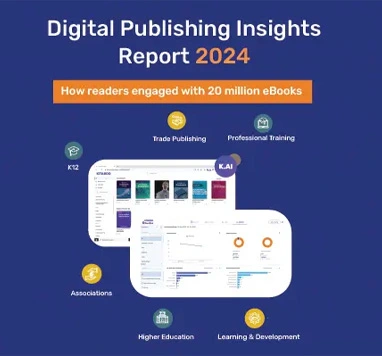The Future of Education is Here: How Educational eBooks are Transforming Learning
Today, when technology is reshaping the world, the way we acquire knowledge is undergoing a profound shift, and educational eBooks are leading the charge. These innovative digital tools are not just changing the game; they are revolutionizing the very essence of learning itself.
This blog delves into the profound impact of educational eBooks, which redefine learning by offering dynamic, customized experiences and revolutionizing knowledge acquisition and sharing for a brighter future.
For instance, KITABOO offers interactive educational eBooks with multimedia elements, animations, and engaging content, keeping students interested and motivated, thus contributing to the revolution.
Table Of Content
I. What are Educational eBooks?
II. Educational eBooks vs. Traditional Textbooks
III. What is the Impact of Educational eBooks on Learning?
IV. Advantages of Educational eBooks
- Personalized Learning Experience
- Instant Access to Updated Content
- Enhanced Collaboration Among Students
- Reduced Environmental Impact
- Customization for Individual Learning Preferences
V. Best Practices for Using Educational eBooks
- Captivate with Pre-Reading Teasers
- Enrich with Multimedia
- Engage with Interactive Content
- Provide Countless Resources
- Open Doorways to E-Learning
VI. Conclusion
What are Educational eBooks?
Educational eBooks are digital resources that replicate traditional textbooks in a dynamic digital format accessible on various devices like tablets and smartphones. Specifically designed for learners of all ages, from children to adults, these innovative materials integrate multimedia elements, interactive features, and adaptive technologies to enhance the learning experience.
As an example, educational eBooks for kids offer a customized approach to engage young learners through interactive content and captivating visuals, promoting a love for learning from an early age while providing a flexible and convenient way to access educational content anytime, anywhere.
Educational eBooks vs. Traditional Textbooks
Educational eBooks offer dynamic features that traditional textbooks lack, such as multimedia elements, gamification, and interactive assessments. These features create a more engaging and personalized learning experience for students.
Table of Comparison between Educational eBooks Vs Traditional Textbooks
| Aspect | Educational eBooks | Traditional Textbooks |
| Interactivity | Incorporate multimedia elements and quizzes | Limited interactivity and engagement |
| Cost | More affordable | Expensive |
| Portability | Accessible on various devices | Heavy and cumbersome to carry |
| Learning Experience | Dynamic and engaging | Static and traditional |
| Environmental Impact | Eco-friendly, reduce paper usage | Contribute to deforestation and pollution |
| Customization | Personalized learning experience | One-size-fits-all approach |
| Accessibility | Easily accessible on multiple devices | Limited access to content on different devices |
Creating educational eBooks can be time-consuming, but with the proper guidance, it can be achieved seamlessly. You can consider KITABOO to save your precious time as it helps you create an outstanding educational eBook with ease.
What is the Impact of Educational eBooks on Learning?
The educational eBooks have revolutionized how students engage with educational content. Here are some of the impacts of educational eBooks on learning:
- Break Regional and Language Barriers: Educational eBooks can provide access to diverse educational materials in various languages, facilitating learning for students from different backgrounds and promoting inclusivity in education.
- Immersive Learning Experience: Interactive features such as multimedia elements, simulations, and quizzes in educational eBooks create a more immersive learning experience, enhancing student engagement and understanding of complex concepts.
- Enhanced Learning Performance: Research suggests that educational eBooks contribute to enhanced learning performance by providing interactive tools and resources, leading to improved academic outcomes and retention of information.
- Increased Student Engagement: Educational eBooks have been linked to higher levels of student engagement compared to traditional textbooks. Interactive features like videos and quizzes capture students’ interest and motivate them to actively participate in the learning process.
Advantages of Educational eBooks
Educational eBooks offer numerous benefits for learners and educators alike. Let’s explore some of the key advantages that make eBooks a valuable resource for modern education:
1. Personalized Learning Experience
Educational eBooks enable students to learn at their own pace, providing a customized learning journey where they can revisit sections, skip ahead, or delve into complex concepts without feeling rushed or left behind. This approach boosts confidence and a deeper understanding by putting students in control of their learning process.
2. Instant Access to Updated Content
Educational eBooks offer immediate access to the latest information and resources, keeping students abreast of developments in their field. This real-time updating feature eliminates the need for costly reprints, ensuring students have a competitive edge in today’s fast-paced world with always up-to-date content.
3. Enhanced Collaboration Among Students
Educational eBooks facilitate student teamwork and interaction through features that encourage discussions, group projects and shared learning experiences. By allowing students to highlight, annotate, and share thoughts with peers, eBooks promote community building, communication skills, and a more engaging educational environment.
4. Reduced Environmental Impact
eBooks support sustainability by eliminating paper production, reducing waste, and lowering carbon emissions. They also minimize clutter and the need for energy-intensive storage facilities by eliminating physical storage space. Accessible on various devices, eBooks cut down on printing and transportation, further reducing environmental impact.
5. Customization for Individual Learning Preferences
Educational eBooks can be tailored to diverse learning styles with personalized content and adaptive features. By incorporating multimedia elements like videos and interactive quizzes, eBooks enhance the learning experience for visual and auditory learners. Adjustments in font size, color, and spacing make eBooks more accessible for students with visual impairments or reading challenges.
Best Practices for Using Educational eBooks
eBooks are increasingly becoming essential tools in education, especially for K12 education. Here are some effective strategies for maximizing the benefits of best educational eBooks, particularly for young learners:
1. Captivate with Pre-Reading Teasers
Before diving into a new topic, educators can use engaging pre-reading activities like short videos, interactive quizzes, or real-world examples to spark curiosity and prepare students for the upcoming content. These teasers set the stage for learning and help students connect with the material on a deeper level.
2. Enrich with Multimedia
Educational eBooks are enriched with multimedia elements such as colorful illustrations, animations, audio clips, and interactive games. These multimedia features not only make learning more visually appealing and engaging but also cater to different learning styles, helping children grasp complex concepts more effectively.
3. Engage with Interactive Content
Interactive elements like clickable images, drag-and-drop activities, and embedded quizzes in educational eBooks encourage active participation and hands-on learning. By interacting with the content, students can reinforce their understanding, develop critical thinking skills, and stay more focused during their learning sessions.
4. Provide Countless Resources
Educational eBooks offer a vast collection of resources, from e-libraries to educational apps and online tools. This abundance of resources allows learners to explore diverse topics, conduct research, and access a wealth of information beyond traditional textbooks, nurturing a culture of self-directed learning and curiosity.
5. Open Doorways to E-Learning
Educational eBooks introduce students to the world of digital learning, equipping them with essential digital literacy skills and preparing them for the digital age. By engaging in e-learning activities, students can enhance their technological proficiency, collaborate with peers on digital projects, and develop a deeper understanding of how technology can enhance their educational journey.
Conclusion
The future of education is indeed here, and educational eBooks are at the forefront of this educational revolution. By embracing these dynamic digital resources, educators and students alike can unlock a world of possibilities, transforming the way knowledge is acquired and shared.
As we continue to witness the evolution of learning technologies, educational eBooks stand out as a beacon of innovation, paving the way for a more engaging, interactive, and personalized approach to education.
KITABOO is a cloud-based digital publishing platform that transforms learning through educational eBooks. It enables interactive, personalized learning experiences across platforms, enabling student engagement and readiness for the digital era.
Want to learn more? Contact us today!
Discover how a mobile-first training platform can help your organization.
Kitaboo is a cloud-based platform to create, deliver & track mobile-first interactive training content.






